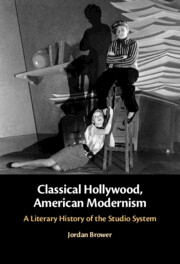Book contents
- Classical Hollywood, American Modernism
- Classical Hollywood, American Modernism
- Copyright page
- Dedication
- Contents
- Figures
- Acknowledgments
- Introduction
- Chapter 1 Paramount Pictures and Transmedial Possibility
- Chapter 2 MGM Modernism
- Chapter 3 The Motion Picture Industry’s Coming of Age
- Chapter 4 Global Hollywood
- Chapter 5 The Scenes of an Ending
- Chapter 6 Conclusion
- Notes
- Index
Chapter 6 - Conclusion
Read Anything Good Lately?
Published online by Cambridge University Press: 04 January 2024
- Classical Hollywood, American Modernism
- Classical Hollywood, American Modernism
- Copyright page
- Dedication
- Contents
- Figures
- Acknowledgments
- Introduction
- Chapter 1 Paramount Pictures and Transmedial Possibility
- Chapter 2 MGM Modernism
- Chapter 3 The Motion Picture Industry’s Coming of Age
- Chapter 4 Global Hollywood
- Chapter 5 The Scenes of an Ending
- Chapter 6 Conclusion
- Notes
- Index
Summary
This book concludes in 1952, the year that the Miracle decision (Joseph Burstyn Inc. v. Wilson) established motion pictures as protected speech, to suggest one way to mark a common endpoint to the eras of the studio system and American modernism. That year, several books were either completed or published that serve as early instances of genres or attitudes that would come to the fore in postwar American fiction. This conclusion briefly addresses three such works: Lillian Ross’s Picture, James Baldwin’s Go Tell it on the Mountain, and Mary McCarthy’s The Groves of Academe. These books suggest a transformation of writers’ attitudes toward Hollywood, one that coincides with the identification of artistic strategies – the nonfiction novel; the conception of moviegoing as an experience worthy of artistic rendering; the campus novel – that would become increasingly prevalent in subsequent decades. The conclusion ends by giving Hollywood movies the chance to speak for themselves, attending to two MGM films of 1952: Singin’ in the Rain and, more intently, The Bad and the Beautiful. I read the latter as MGM’s version of a literary history of the studio system.
Keywords
- Type
- Chapter
- Information
- Classical Hollywood, American ModernismA Literary History of the Studio System, pp. 178 - 191Publisher: Cambridge University PressPrint publication year: 2024



